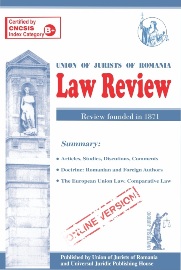- Scientific Life
Artificial intelligence in the judicial system - a threat to human rights?
Artificial intelligence, altogether with its benefits and possible threats in every domain of our lives, is one of the most discussed phenomenon, in recent years. Although the concept and its implications are not a new subject for researchers, artificial intelligence comes as rather controversial, and tends to rapidly change and evolve, even before we understand what it actually means and how we can use if for our benefit. AI is very likely to become a weapon in the hands of the people who will manage the rapid evolution of it and will be able to use as an advantage with crucial effects for humanity. Today, in the context of using artificial intelligence systems to carry out functions in the criminal justice sector, a new variety of debates are taking the stage, particularly in the sense of analysing if AI technology is actually used to solve problems of criminal justice and law related issues, or is in fact endangering the respect of human rights, fundamental liberties and aggravating discrimination and social divisions. In recent years, criminal justice systems have been making use of automated tools in order to identify potential suspects, generate recidivism scores and guide judges in the decision-making process of applying legal measures and sentences, in accordance with the respective results. This article discusses the disproportions which can appear in the results, due to association of, for example, a low-income category of people, of people who are a part of a minority community, with a higher risk for committing crimes, which can ultimately generate discriminating measures and sentences, adding up to the already existing social inequalities and affecting human rights. There should be a high support the implementation of AI in the judicial systems and the environment, as long as fundamental human rights are respected and AI is used for the common good and improving the existent systems by ensuring more efficiency and quality results.
Volume XIII, issue 1, January-June 2023 2023

Summary
European Union Law
Administrative practices as an infringement of the law of the European Union
Overview on the criminal justice system in Bulgaria. Comparative law. A Bird’s Eye View
The profession of legal advisor in european countries
Legal regime of competition in Slovenia
International Law
Ruscism – A threat to international legal order and the security of all humanity
